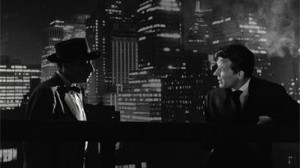STUDIO: Cohen Media Group | DIRECTOR: Jean-Pierre Melville | CAST: Pierre Grasset, Jean-Pierre Melville, Ginger Hall, Colette Fleury, Monique Hennessy
RELEASE DATE: 9/17/13 | PRICE: DVD $29.98, Blu-ray $39.98
BONUSES: conversation between critics Jonathan Rosenbaum and Ignatiy Vishnevetsky, essay by Ginette Vincendeau
SPECS: NR | 85 min. | Crime drama | 1:33 widescreen | mono | French and English with English subtitles
This DVD and Blu-ray release of Two Men in Manhattan represents the first time this “missing” 1959 film by Jean-Pierre Melville, the master director of Le Samourai and Le Cercle Rouge, has been available in any U.S. home-entertainment medium. That is strange indeed, as the film is set in, and the exteriors were shot in, New York City, a burg that Monsieur Melville clearly had a great love for.
Thus we are treated to gorgeous nighttime views of various locations around Manhattan (and the Ridgewood neighborhood that straddles Queens and Brooklyn), all set to a brassy jazz score, making the film seem like an episode of the Naked City TV series. Melville was a deeply obsessive cinephile (he no doubt drew on the Jules Dassin Naked City film as an influence), and one gets the impression here that he, to use Woody Allen’s phrase in Manhattan, “romanticized [the city] all out of proportion.” His noir enthusiasm, though, is truly infectious.
Which is a good thing, given that this film was made just before he perfected his style with Le Doulos (1962) and was literally able to fashion memorable characters out of modes of behavior and an unerring sense of style.
 The plot of Two Men is a routine affair about a reporter’s search for the missing French delegate to the U.N. The reporter (played by Melville) recruits an alcoholic ace photographer (Pierre Grasset), and the two look for the missing diplomat by visiting his many mistresses. The film ends not with a bang, but with a quiet ethical dilemma placed on the shoulders of the photographer.
The plot of Two Men is a routine affair about a reporter’s search for the missing French delegate to the U.N. The reporter (played by Melville) recruits an alcoholic ace photographer (Pierre Grasset), and the two look for the missing diplomat by visiting his many mistresses. The film ends not with a bang, but with a quiet ethical dilemma placed on the shoulders of the photographer.
Melville was hailed as a major inspiration by the French New Wave, because of his trailblazing work as an independent filmmaker on his debut (The Silence of the Sea) and the terrific crime drama Bob Le Flambeur (1956). Although released in the year the New Wave “broke,” Two Men is an odd specimen, since it contains many set-bound interior sequences (shot in France) that work against the verisimilitude of the outdoor NYC locations.
As with many international productions, another problem with the film are the lackluster performances of the English-speaking cast members. And while Melville was a scene-stealing actor in Breathless playing a pontificating writer, he was not a strong enough performer to carry an entire film. Thus, all of his films after this one wisely had a strong screen presence in the lead role — there were three each with Belmondo and Delon, and two with Lino Ventura.
The extras include a lengthy chat between critics Jonathan Rosenbaum and Ignatiy Vishnevetsky, in which Rosenbaum pinpoints the best aspects of the film and the ways in which it relates to Melville’s other work (and how it influenced Godard’s Breathless in small ways). A printed essay by Ginette Vincendeau provides concrete details about the shoot and whether the film qualifies as a work of the New Wave.
Two Men in Manhattan is thus not a Meville classic, but it will intrigue and entertain those who have already seen the director’s more prominent work.
|
Buy or Rent Two Men in Manhattan
|
|||
|---|---|---|---|
DVD |
 DVD | Blu-ray DVD | Blu-ray |
 DVD | Blu-ray DVD | Blu-ray |
|
Leave a Reply